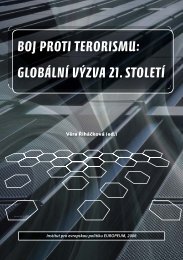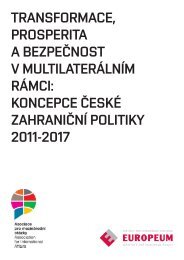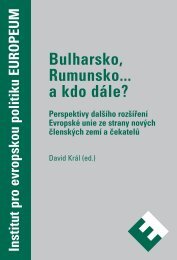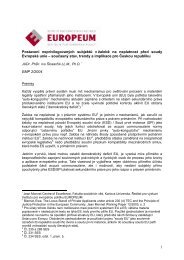eu constitutionalisation - EUROPEUM Institute for European Policy
eu constitutionalisation - EUROPEUM Institute for European Policy
eu constitutionalisation - EUROPEUM Institute for European Policy
Create successful ePaper yourself
Turn your PDF publications into a flip-book with our unique Google optimized e-Paper software.
Chapter 6: A ‘saut constitutionnel’ out of an intergovernmental trap?entiated and thus less consistent approach of the Commission as a collegiatebody? In one variation of the future division of labour, the Commission(including its President) would be just responsible <strong>for</strong> ‘internal affairs’,whereas the UMFA (perhaps together with the Chair of the <strong>European</strong>Council) would take up all functions <strong>for</strong> ‘external action’. Such a patternmight resemble the political system of France.Quite often it is neglected that his/her job description includes a thirdmajor role: the UMFA will be Chair of the Foreign Affairs Council (Art. I-28 (3)); this office has so far been run by a national <strong>for</strong>eign minister duringits rotating presidency.A first assessment of the new institution stresses different aspects of a costbenefitanalysis. In relation to the job profile and associated expectations,the actual procedural means and policy instruments at the UMFA’s disposalare limited.One plus is that the tasks assigned to this position give reason to expecta higher degree of efficiency and effectiveness of the external action of theUnion. As compared to the practice of biannual rotation, the continuityof the Union’s external representation will be improved significantly andfacilitate the building of relationships of trust with partners in the internationalsystem. For the Union’s role in the international system the upgraded‘face’ and ‘voice’ will be a major asset. To also rein<strong>for</strong>ce the ‘hand’ of the EUthe UMFA “shall be assisted by a <strong>European</strong> External Action service”(Art.I-296 (3)), which will comprise officials from the Council’s secretariat, theCommission and from national diplomatic services.More open to debate is the internal weight of this person. Some masters ofthe TCE have invested great hopes in this office⁴³ and anticipate that theUMFA will advance the objectives of the Union through far reaching proposalsand activities. However, as President of the Foreign Affairs Council,the main objective of the Union Minister will remain – not least becauseof the dominant use of unanimity – the <strong>for</strong>ging of consensus among themember states. In fulfilling these duties, the Foreign Minister will have to43) See e. g. FISCHER, J. and VILLEPIN, D. de (2003), Franco-German contribution to the <strong>European</strong> Conventionconcerning the Union’s institutional architecture, CONV 489/03, 16.01.2003, Italian IGC Presidency(2003), Presidency Note on the IGC 2003 – Union Minister <strong>for</strong> Foreign Affairs, CIG 45/03, 10.11.2003,[23.11.2005].216Chapter 6: A ‘saut constitutionnel’ out of an intergovernmental trap?reconcile different political interests not only of member states, but also ofCommission departments and relevant interest networks. Also <strong>for</strong> creatingprocedural dynamics his/her right to propose a QMV is very indirect: theCouncil of Ministers decides with a qualified majority, “on proposal whichthe Minister has put to it following a specific request to him or her fromthe <strong>European</strong> Council made on its own initiative or that of the Minister”(Art. III-300 (2b). With this complicated <strong>for</strong>mula, the Foreign Ministerremains again dependent on a preceding unanimous agreement in the<strong>European</strong> Council. Thus, the Foreign Minister does not receive any specialprerogatives, as the Commission possesses in other parts of the present TEUand of the future constitutional treaty; the Convention and the IGC havethereby denied him an important and powerful instrument, i.e. to exertpressure on colleagues in the Council with such a procedural instrument.The Italian presidency in the IGC had proposed to change this <strong>for</strong>mulationto strengthen the UMFA⁴⁴, but others did not follow.In both ‘home’ institutions, the UMFA will have to resort to his/her powersof persuasion. Quite probably, ministerial colleagues will, however, grantonly limited national contributions to the strengthening of the EU as a globalactor. A significant share of operative resources <strong>for</strong> external action willstill fall under the Commission’s competences – such as financial assistanceand matters of market access – thus the Foreign Minister will be induced touse this derived potential weight also during his work in the Council.In sum, the <strong>for</strong>mulations <strong>for</strong> the ‘double hat’ create a grey area of vaguepolitical responsibility, in which the UMFA might suffer from suspicionsfrom both Council and Commission that this person is a ‘Trojan Horse’of the rival institution⁴⁵; this office, however, could also profit from theseambiguities, if the Foreign Minister is able to combine different roles: theUMFA has the opportunity to link multi-layered functions and tasks so as touse a comparative advantage of in<strong>for</strong>mation and influence from one area toadvance positions more easily in another. This influence, however, remainsdependent on the goodwill of other players, who could rather easily damagethe profile and reputation of this person. In the experimental phaseof the living constitution, each co-player will ‘test’, if and how the UMFAwill yield to their respective own interests and rights.44) Italian IGC Presidency (2003)45) THYM (2004), p. 21.217








